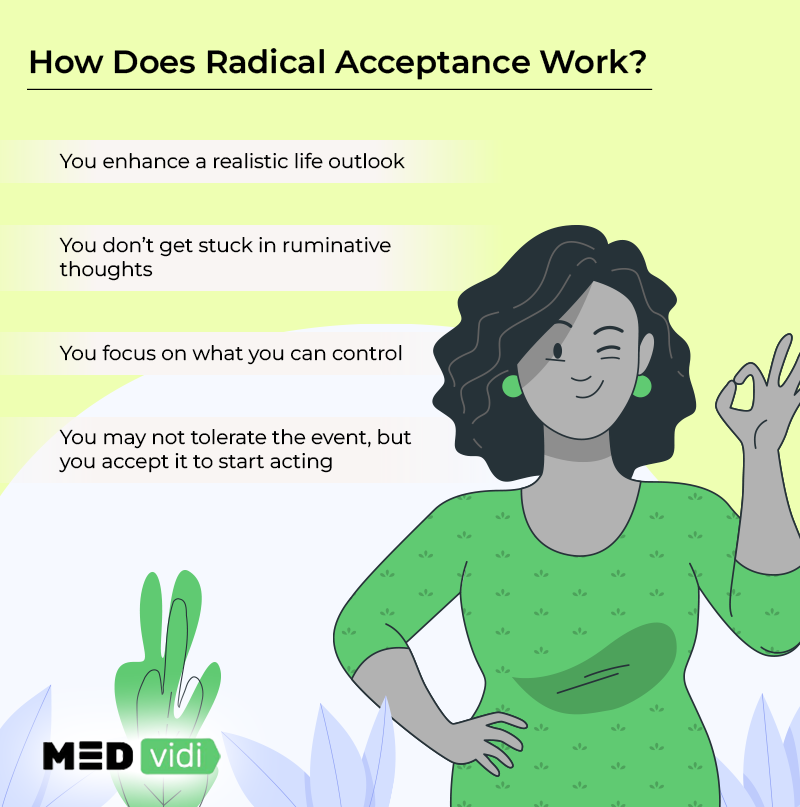No one’s life is easy. No matter who you are, what you do, or where you’re from, your journey will always have ups and downs. That’s why the ability to persevere whenever life gives us lemons is critical. This is the logic behind what’s defined as radical acceptance.
Radical acceptance, by definition, is a practical distress tolerance skill that teaches us to remain stoic in the face of any pain or challenges that we are confronted with. It allows us to move past them without unnecessary suffering.
Whereas forgiveness involves showing compassion and kindness to the world around us, radical acceptance is the act of directing kindness and compassion toward ourselves.
Radical acceptance is one of the core skills which has its roots in
Do you need help with improving your emotional or mental state? MEDvidi doctors are here for you.
Practicing Radical Acceptance
It is said that acceptance is the first step toward healing when dealing with adversity and difficult situations. Still, there are several elements involved in this process. Let’s take a closer look at the steps of acceptance we should all be familiar with.
- Acknowledging your present reality. Pay close attention to the things, events, or emotions that initiate feelings of resistance within you. Practice the type of mindfulness that alerts you and makes you conscious of anything you are unwilling to accept. Practicing mindfulness can enhance one’s capacity for
cognitive reappraisal[2] . - Understand your ability to influence reality. Constantly remind yourself that there are certain things you can change and some that you cannot. Never allow yourself to dwell on something that you cannot control.
- Envision the future. Whenever you’re in a tough spot, picture what you would do if you had already accepted and overcome the difficulty. Take this mental picture and model it in reality, acting as if you have already accepted it.
- Practice self-examination. Train yourself to understand and recognize your emotions and mental states through
strategies[3] such as journaling, meditation, and mindfulness. - Be open to your emotions. Rather than blocking your feelings, allow yourself to embrace your emotions without fear, guilt, or apprehension. Understand that pain is a part of life, and refusing to acknowledge and push past it will often deepen it, making it last even longer.
- Practice self-compassion. Be compassionate and gentle with yourself throughout the process. Use positive affirmations to help you stay centered and focused on acceptance, rather than negative self-blame.
- Regular physical activity. Exercise can be a helpful complement to practicing radical acceptance by allowing us to focus on the present moment as the person ages.
- Control the temptation to lash out. When dealing with difficult situations, many of us might feel the urge to lash out at others or indulge in harmful behaviors in an attempt to smother negative emotions. Drinking too much, overeating, or behaving inappropriately at work might seem to be a resort, but in fact, it will only make the situation worse.
- Be more intentional in your life. Make a conscious decision to practice acceptance whenever you’re forced to contend with unpleasant circumstances and emotions. Take every day as a new opportunity to grow and learn.
- Practice radical acceptance daily. Take some time to analyze yourself and review your circumstances, and create a list of the advantages and disadvantages you face by practicing radical acceptance.
Self-help techniques are beneficial, but sometimes they are not enough. Mental health experts can make the path to relief quicker.
Radical Acceptance in the Context of Interpersonal Relationships
While the benefits of radical acceptance in our daily lives are not difficult to observe, there are certain distinctions we need to make for our health and well-being. Radical acceptance is not about accepting unacceptable situations.
This can be seen most clearly in the context of romantic relationships. Radical acceptance within such a relationship means loving and accepting your partner for who they are, regardless of any quirks or faults they might have. However, this does not include inexcusable behaviors such as physical, emotional, verbal, and other types of maltreatment.
Unwillingness to accept inappropriate things can also be carried over into non-romantic interpersonal settings such as learning institutions, workplaces, and public spaces. Do not let yourself become a doormat in the face of sexual harassment, unfair treatment in the workplace, and other toxic scenarios.
The discomfort, anxiety, depression, and general negativity that come with
Improve your well-being and interpersonal connections with the help of a mental health professional.

Final Thoughts
You’ve probably come across the famous quote by Buddha, where he tells us that while pain is inevitable, suffering is optional. This is a quote that holds for every one of us.
Radical acceptance can help us regain purpose and control over our lives. It allows us to convert all the negative energy wasted by resistance into the fuel we need to create a new reality for ourselves.
Radical acceptance is a skill we can develop over time, meaning we can become better at practicing it and derive greater benefits from it. But if you find it overwhelming or unbearable to deal with life challenges at some point in your life, mental health experts are here to offer you support.











